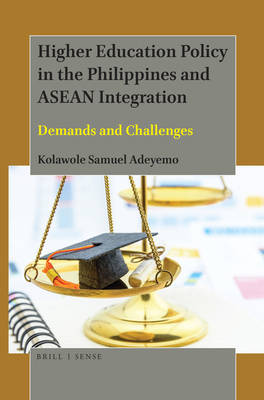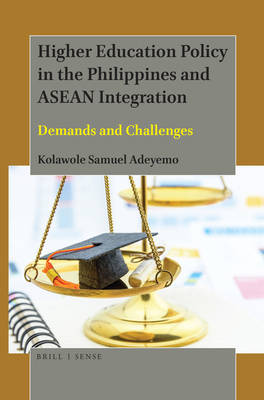
- Afhalen na 1 uur in een winkel met voorraad
- Gratis thuislevering in België vanaf € 30
- Ruim aanbod met 7 miljoen producten
- Afhalen na 1 uur in een winkel met voorraad
- Gratis thuislevering in België vanaf € 30
- Ruim aanbod met 7 miljoen producten
Zoeken
Higher Education Policy in the Philippines and ASEAN Integration
Demands and Challenges
Kolawole Samuel Adeyemo
Paperback | Engels
€ 94,95
+ 189 punten
Uitvoering
Omschrijving
Globalisation has brought a number of regional cooperation, collaboration, partnership and networking initiatives among different countries. The regionalisation of higher education or its initiators have used different terms to define their objectives. For Asian higher education, this relationship has extended beyond the broader idea of higher education cooperation for instance, to include different networks and agreements within region and outside region on matters related to research, student mobility and quality assurance among Asian countries and between Asia and other countries that share a similar vision on education.
This book examines and analyses the status of education policy in the Philippines and, more particularly, focuses on the issue of the integration of higher education in the Association of Southeast Asian Nations (ASEAN). It further examines ASEAN integration policies and what the Philippines could do to underpin these policies. The objective is to better understand the problems of global policy in the context of regionalisation, harmonisation and integration from both an ASEAN and a Philippine perspective. Prospective mechanisms of ASEAN for upgrading the quality of education provision through student mobility, staff exchange, regional accreditation and articulation are succinctly argued in this book. Methodologically, various research designs and methods, including a literature review, as a well as an empirical data and secondary data analysis were used. ASEAN leaders, higher education researchers and policymakers may find the results discussed in this book useful.
This book examines and analyses the status of education policy in the Philippines and, more particularly, focuses on the issue of the integration of higher education in the Association of Southeast Asian Nations (ASEAN). It further examines ASEAN integration policies and what the Philippines could do to underpin these policies. The objective is to better understand the problems of global policy in the context of regionalisation, harmonisation and integration from both an ASEAN and a Philippine perspective. Prospective mechanisms of ASEAN for upgrading the quality of education provision through student mobility, staff exchange, regional accreditation and articulation are succinctly argued in this book. Methodologically, various research designs and methods, including a literature review, as a well as an empirical data and secondary data analysis were used. ASEAN leaders, higher education researchers and policymakers may find the results discussed in this book useful.
Specificaties
Betrokkenen
- Auteur(s):
- Uitgeverij:
Inhoud
- Aantal bladzijden:
- 150
- Taal:
- Engels
Eigenschappen
- Productcode (EAN):
- 9789004411302
- Verschijningsdatum:
- 29/08/2019
- Uitvoering:
- Paperback
- Formaat:
- Trade paperback (VS)
- Afmetingen:
- 152 mm x 231 mm
- Gewicht:
- 249 g

Alleen bij Standaard Boekhandel
+ 189 punten op je klantenkaart van Standaard Boekhandel
Beoordelingen
We publiceren alleen reviews die voldoen aan de voorwaarden voor reviews. Bekijk onze voorwaarden voor reviews.











